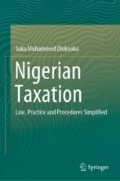Objective
In this chapter, our aims will be to expose the readers to
-
i.
the meaning of tax offences
-
ii.
know the different classes and categories of offences under the Nigerian tax laws.
Access this chapter
Tax calculation will be finalised at checkout
Purchases are for personal use only
Notes
- 1.
Hornby A.S Oxford Advanced Learner’s Dictionary of Current English, International Student Edition (7th edn, Oxford University Press, 2005), p. 1011.
- 2.
Sheila Borne (ed.) Osborn’s Concise Law Dictionary (19th edn. Sweet and Maxwell, 2001), p. 271.
- 3.
Ibid, p. 116.
- 4.
Paul Minn Black’s Law Dictionary (7th edn. West Group, St. Paul, Minn 1999), p. 1108.
- 5.
(2006) 8 NWLR (pt 983) 624.
- 6.
Abdulrazaq M.T. Tax Offences and Penalties. (Batay Law Publication Ltd, Ilorin, 1993), p. 37. See also, Abdulrazaq M.T. Nigerian Tax Offences and Penalties (2nd ed. Princeton and Associate Ltd. Lagos, 2014), p. 44.
- 7.
Compounding an offence is treating a criminal offence as civil by attaching replacing jail term with money fines. This power for tax authority is enshrined in Section 48(1) FIRS Act 2007, see also Section 94(2) CITA Cap LFN 2004.
- 8.
This was the decision in the case of Garba v. University of Maiduguri (1986) 1 NWLR (pt 18) 550. Similar position was held in Federal Civil Service v. Laoye (1989) 2 NWLR (pt 106) 652.
- 9.
See Section 36(12) Constitution of the Federal Republic of Nigeria, 2011. The same position was affirmed in the cases of Aoko v. Fagbemi (1961)1 ALL NLR 400, Ekwuasi v. DPP Lagos State & Ors (1999) 3 NWLR (pt 593) 31 and Udokwu v. Onugha (1963)7 E.N.L.R 1.
- 10.
For instance, offences in Section 94(3) PITA, 2004 are entertained by the magistrate, while part V FIRSEA 2007 provides for penalties to be levied by the revenue authorities in case of default by taxpayers. Similar provisions are contained in part IX and XII PITA 2004. For further discussion on general judicial response to the criminality in taxation, see M.T. Abdulrazaq, Taxation System in Nigeria (Gravitas Legal Business Resources Ltd, Lagos, 2016).
- 11.
Igweike K.L ‘Corporate Planning and Management: An Overview Issues and Perspectives’ UNIJOS Law Journal, Vol. 9, 2003, p. 12.
- 12.
See Section 48(1) FIRS Act, 2007. Similar provision is in Section 94(2) Companies Income Tax Act CAP C21 LFN 2004 (as amended).
- 13.
Section 341(2) LFN, 2004.
- 14.
What the accused person must satisfy to be granted bail in respect of a non-bailable offence upon application which must be supported with sworn affidavit as stated in Section 341(2) are:
-
(a)
that by any reason of the granting of bail the proper investigation of the offence would not be prejudiced; and
-
(b)
that no serious risk of the accused escaping from justice be occasioned; and
-
(c)
that no grounds exist for believing that the accused, if released would commit an offence.
-
(a)
- 15.
See Section 162 (a–f) Administration of Criminal Justice Act No 13, 2015.
Relevant Authorities and References for Further Reading
Cases
Aoko v. Fagbemi: 1 ALL NLR 400, Udokwu v. Onugba (1963)E.N.L.R 1, Ekwuasi (1961)
v. DPP Lagos State & Ors: 3 NWLR (pt 593) 31. On the fact that a criminal offence can only qualify as one if so stated in a written law as such (1999)
Garba v. University of Maiduguri (1986) 1 NWLR (pt 18) 550, Federal Civil Service v. Laoye (1989) 2 NWLR (pt 106) 652 Wherein the court held that an administrative body lacks jurisdiction to try criminal offence
Unipetrol Nigeria Plc v. Edo State Board of Inland Revenue: 8 NWLR (pt. 983) 624 Where it was held that tax authority can prosecute tax offences in its name (2006)
Books
Abdulrazaq, M.T.: Tax Offences and Penalties. Batay Law Publications Ltd Ilorin (1993)
Abdulrazaq, M.T.: Tax Offences and Penalties, 2nd edn. Priston and Associate Ltd., Lagos (2014)
Abdulrazaq, M.T.: Taxation System in Nigeria. Gravitas Legal Business Resources Ltd, Lagos (2016)
Hornby, A.S.: Oxford Advanced Learner’s Dictionary of Current English, International Student Edition, 7th edn. Oxford University Press (2005)
Minn, P.: Black’s Law Dictionary, 7th edn. West Group, St. Paul, Minn (1999)
Sheila, B (ed.): Osborn’s Concise Law Dictionary, 19th edn. Sweet and Maxwell (2001)
Journal
Igweike, K.L.: Corporate planning and management: an overview issues and perspectives. UNIJOS Law J 9, 12 (2003)
Author information
Authors and Affiliations
Corresponding author
Rights and permissions
Copyright information
© 2019 Springer Nature Singapore Pte Ltd.
About this chapter
Cite this chapter
Olokooba, S.M. (2019). Definition and Classification of Tax Offences. In: Nigerian Taxation. Springer, Singapore. https://doi.org/10.1007/978-981-13-2607-3_7
Download citation
DOI: https://doi.org/10.1007/978-981-13-2607-3_7
Published:
Publisher Name: Springer, Singapore
Print ISBN: 978-981-13-2606-6
Online ISBN: 978-981-13-2607-3
eBook Packages: Law and CriminologyLaw and Criminology (R0)

